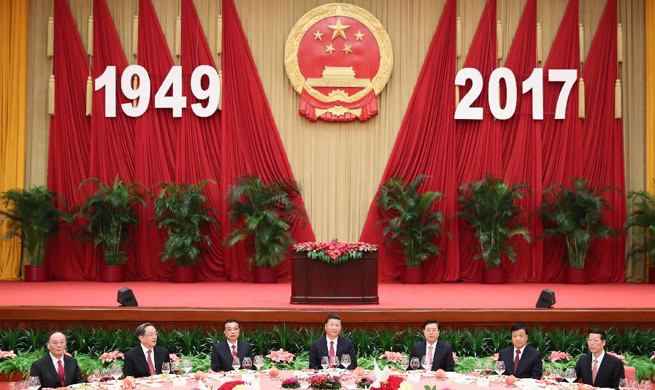
U.S. President Donald Trump (Xinhua file photo)
by Xinhua writers Gao Pan, Jin Minmin
WASHINGTON, Sept. 30 (Xinhua) -- The U.S. Federal Reserve could move toward a much more dovish stance in monetary policy as President Donald Trump, who favors a low-interest-rate policy, has a unique opportunity to reshape the central bank's leadership, a leading U.S. economist has said.
RESHAPE THE FED
"We're going to end up with a dovish Fed, because so many members of the board are going to change once and will be appointed by President Trump," Adam Posen, president of the Peterson Institute for International Economics, a Washington-D.C. based think tank, told Xinhua in a recent interview
"It's very clear President Trump wants lower interest rates for a bunch of reasons," he said.
Currently, there are three vacancies in the Fed's seven-member board of governors. As Fed vice chair Stanley Fischer will resign around Oct. 13 for personal reasons and Fed Chair Janet Yellen's current term expires on Feb. 3, Trump has a unique opportunity to reshape the central bank by appointing as many as five new members of the board, including the next Fed chair.
"We've had four meetings for Fed chairman, and I'll be making a decision over the next two or three weeks," Trump told reporters on Friday.
Trump has interviewed former Fed governor Kevin Warsh and current Fed governor Jerome Powell in recent days to discuss their potential nominations as the next leader of the central bank, according to media reports.
Trump has also met with Yellen and White House National Economic Council Director Gary Cohn, who are both in the running for the post but unlikely to be nominated by the president, according to Posen.
Other potential contenders under consideration include Stanford University economist John Taylor, Columbia University economist Glenn Hubbard, and former BB&T Bank chief executive John Allison.
"My expectation is whoever Trump appoints will end up acting much more dovish than people expect," Posen said, expressing his concern that the next Fed Chair could be like former Fed chief Arthur Burns under the Nixon administration, who was slow to raise interest rates in the early 1970s.
"Even if he is a very smart professor, who talks a lot about monetary rules and tightening, I think in the end for political pressure reasons, they will tighten less than people expected," he said.
SUBDUED INFLATION
However, "it's probably not the worst thing" with a more dovish Fed for the next couple of years, as U.S. inflation has been running stubbornly below the central bank's target of 2 percent for five years, said Posen, a former policymaker at the Bank of England.
"There is a case that having inflation be higher than target for a couple of years wouldn't be so bad ... I'm not sure this does any damage in the short term," he said.
The core personal consumption expenditure (PCE) index, Fed's favor inflation indicator, rose only 1.4 percent year on year in July, lower than the 1.9 percent gain in January.
While expecting inflation to gradually move up to the target, Yellen said on Tuesday that she acknowledged the uncertainty surrounding that prediction.
"Many uncertainties attend this assessment, and downward pressures on inflation could prove to be unexpected persistent," Yellen told the National Association for Business Economics.
Posen said the timing of the Fed's next rate hike, whether in December or in March, doesn't matter much, as the debate among Fed policymakers is "how much the low inflation is ongoing."
In his view, the U.S. economy is "pretty far from" the turning point that inflation will take off more rapidly, despite the historically-low unemployment rate.
Over the long term, Posen expressed concern that Trump's nominees for Fed board would be reluctant to intervene in markets and quickly respond to changes in economic conditions.
"If there's a stock market crash, there's a recessionary shock, even if there is a huge fiscal stimulus ... I am worried that...they would be very reluctant to be activists or talk about rules and be slow to respond. So I think there's some danger there," he said.
Compared with potential monetary policy mistakes, Posen was more worried about the Trump administration's attempt to roll back Obama-era financial regulations.
"I am much more worried about Trump's appointees changing financial supervision and financial regulations ... that's where the biggest mistake will come and they have a lot of support in Congress," he said.
Trump has made deregulation a key part of his financial agenda and repeatedly blamed the 2010 Dodd-Frank Act, which was designed to prevent another financial meltdown, for stifling economic growth.
But Yellen warned last month that policymakers should not ignore the lessons from the 2008 financial crisis that hit the U.S. economy and households hard.
Any changes to the post-crisis financial reforms should be "modest" as these reforms have made the financial system substantially safer and resilient, she said.
BALANCE SHEET UNWINDING
The Fed announced last week that it would start a program in October to gradually unwind its 4.5-trillion-U.S.-dollar balance sheet, a well-telegraphed move to withdraw its record monetary stimulus since the financial crisis.
The process of unwinding the balance sheet will work similar to a tightening monetary policy leading to an increase in interest rates. But markets haven't reacted much as the Fed's plan was initially outlined in June and it would unfold very gradually.
"I think they're making the right move by sort of doing this in an automatic way," Posen said, expecting the Fed's balance sheet to shrink meaningfully over the next two years.
While global growth rate has come down to around 3 percent from 5 percent before the financial crisis, Posen believed the global economy is really "in better shape" to handle the Fed's monetary policy tightening.
Most households and non-financial corporates in major economies "have been shrinking debt" and most banks "have much less leverage," compared with a lot of private leverages in the U.S. and Europe before the financial crisis, he said.
"Because of this combination that it's less leveraged and the growth rates are solid ... I'm less worried," he said, adding the effects of U.S. monetary tightening on the global economy will be "much less this time than the past," although some emerging market economies could face the challenge of capital outflows.
Recalling the "taper tantrum" of 2013 when former Fed Chairman Ben Bernanke first mentioned the idea of tapering the Fed's pace of asset purchases, Posen said it "was really a shock" to the markets, which sent bond yields soaring and stock prices tumbling, because "most people thought it was going to start tightening."
The European Central Bank (ECB) is likely to move in the same direction in October, setting out plans to scale back its own asset purchase program. Posen expected "there will be more market reactions" when the ECB does make that announcement, because "they haven't had the taper tantrum yet."
However, the start of Fed's balance sheet reduction in October is just the continuation of a Fed tightening cycle started in December 2015, when the central bank raised interest rates for the first time in nearly a decade. It's unlikely to shock the financial markets, he said.

















